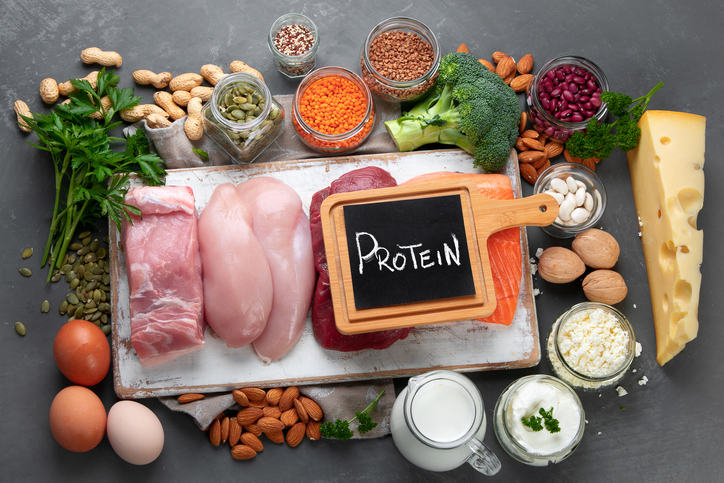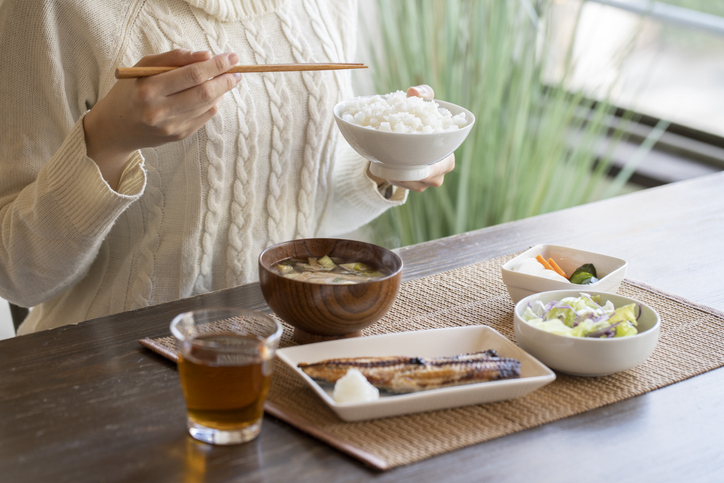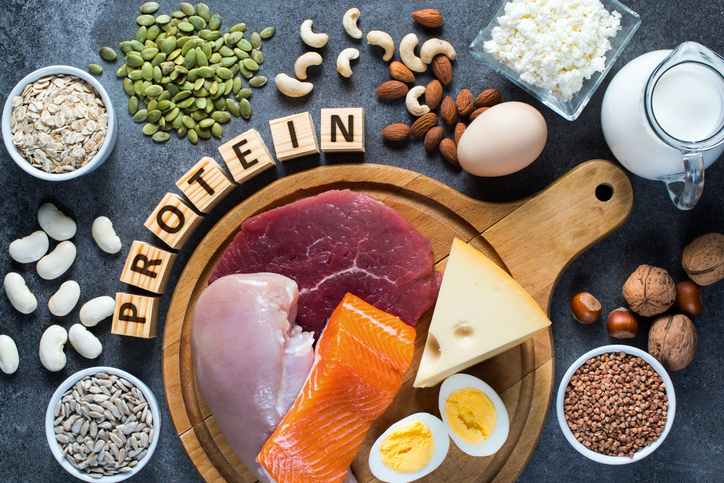Beauty and health - daily diet is essential for everyone who pursues these two keywords. Protein is one of the most important nutrients to focus on. However, many people are still unsure of the recommended daily intake of protein.
Here, we will explain in detail the importance of protein, its role, recommended intake, and effective ways to consume it from a professional perspective in aesthetic medicine. For those of you who pursue beauty and health through diet, this will surely be a useful reference for your daily food choices. Enjoy your own life by gaining a new perspective on how to achieve beauty and health.

Graduated from the Faculty of Medicine, National Kumamoto University. After serving as the director of major beauty clinics in Japan, etc., he opened Aladdin Aesthetic Clinic in 2023. He is a professional in aesthetic medicine with a doctorate in anti-aging research and many years of experience. With the motto of "Toward the realization of cosmetic medicine without lies," he aims to be the "Only One" together with his patients.
What proteins are essential for beauty?

Proteins are the basic building blocks of our bodies and are essential to our health and beauty. This is because proteins are broken down in the body into "amino acids," and these amino acids are the materials that repair the body's cells and produce new cells.
From a physical aspect, protein is the main component of muscles, bones, skin, hair, and nails. Protein is also required for the production of antibodies, enzymes, and hormones for the proper functioning of the immune system. Protein is also a source of energy and helps maintain nutritional balance.
About Protein from a Beauty Perspective
From a beauty perspective, proteins are deeply involved in the health of the skin, hair, and nails in particular. For example, skin is supported by two proteins, collagen and elastin, and when these are reduced, the skin loses elasticity, resulting in wrinkles and sagging.
Keratin, the main component of hair, is also protein, and protein is essential for healthy hair. Nails are similarly formed from protein and require adequate protein intake to maintain their strength and health.
Protein not only makes up our bodies and maintains bodily functions, but also plays an important cosmetic role. Protein intake is an important issue for all those seeking both beauty and health.
The truth about the recommended daily intake of protein

Protein intake is very important for maintaining physical health and beauty. On the other hand, it is important to remember that no matter how much protein is needed, it must be consumed in adequate amounts.
In general, the recommended daily intake for adult men is about 65 grams and for adult women is about 50 grams. This is the standard recommended by nutrition experts, and this amount is sufficient to meet the body's protein requirements.
So, how much food would you have to eat to get the recommended daily intake of protein from your diet? Please refer to the following table.
| Food name | amount of intake |
|---|---|
| natto (fermented soybeans) | 10 packs |
| tofu | Approx. 4 guns |
| (cow's) milk | Approx. 7 cups |
| yogurt | Approx. 11 pieces |
| salad chicken | 100 grams 3 pieces |
| salmon (any fish of the family Salmonidae) | About 4 slices |
| Egg (boiled) | Approx. 9 pieces |
As mentioned above, it takes a very large amount of food to meet the daily protein requirement from the diet. Therefore, many people are actively engaged in supplementation as well.
However, the above recommended intake is a general guideline and will actually vary depending on individual age, gender, weight, and physical activity level. For example, older adults are recommended to consume more protein than the average adult to prevent loss of muscle mass. Also, people who engage in high levels of physical activity, such as athletes and manual laborers, need more protein to support muscle repair and growth.
With respect to gender, men need more protein than women because of their greater muscle mass. On the other hand, women during pregnancy and lactation require more protein than normal to maintain the health of themselves and their babies.
This means that the recommended daily intake of protein cannot be determined in general, and the appropriate amount will vary depending on individual lifestyle and health status. And that is the key to understanding and practicing protein intake.
Protein-rich foods
Protein is found not only in animal foods such as meat and fish, but also in plant foods. Below are some protein-rich foods.
- Meat (beef, chicken, pork): lean meats in particular are rich in protein; they contain about 20-30 grams of protein per 100 grams.
- Fish (tuna, salmon, mackerel): Lean tuna is particularly rich in protein, containing about 24 grams of protein per 100 grams.
- Bean products (soybeans, natto, tofu): Soybeans are one of the richest plant foods in terms of protein, containing about 36 g of protein per 100 g.
- Eggs: Eggs are a great source of protein, containing about 6 grams of protein per egg.
- Dairy products (yogurt, cheese): low-fat yogurt and cheese in particular are high in protein.
Meat and fish are also rich in iron and B vitamins, both of which are effective in energy metabolism and reducing oxidative stress. Bean products, on the other hand, contain dietary fiber and isoflavones, which relieve constipation and have antioxidant properties. Eggs are rich in vitamins A and D and essential amino acids, which contribute to stronger immunity and bone health. Dairy products are high in calcium and vitamin D, which help maintain healthy bones and teeth.
By consuming these foods in good balance and using appropriate cooking methods, it is possible to efficiently consume protein and support beauty and health.
Absorption depends on the cooking method? Points to keep in mind when cooking
| food group | Cooking Points |
|---|---|
| Fish & Meat | Moderate heating improves absorption in the body. |
| Beans (tofu, natto, etc.) | Overheating hardens the protein and reduces absorption. |
| egg | Heat, if possible, as eating raw also carries the risk of salmonella food poisoning. |
| dairy products | Eat as is or heat at low temperature for a long time. |
Depending on how it is cooked, protein can be obtained more effectively from foods. For example, cooking meat and fish moderately will help break down the protein and improve its absorption in the body.
On the other hand, soybean products such as tofu and natto need to be carefully controlled because overcooking may harden the protein and reduce the absorption rate.
In addition, eggs should always be heated before eating raw because of the risk of salmonella food poisoning. Dairy products are best eaten raw or heated at low temperature for a long time.
Don't get me wrong! Q&A in Protein and Beauty

The following is a list of common questions and answers about protein intake. With this knowledge, you can more properly consume protein and maximize its benefits to your beauty and health.
Q1. Is more protein better?
That is not necessarily true. Protein is indeed an important building block of the body and essential for beauty and health, but consuming more than the proper amount can be stressful to the liver and kidneys. The appropriate intake depends on individual weight, age, gender, and physical activity.
Q2. Is protein only available from animal products?
That is a fallacy. Protein can be obtained from plant foods as well as animal foods. Plant foods such as soybeans, lentils, and quinoa also contain protein.
Q3. Should only muscle trainers be concerned about protein intake?
That is also a fallacy. Protein is necessary for building muscle tissue, but that is not all. It is also needed for the production of skin, hair, nails, hormones, and enzymes, and is an important nutrient for immune system function. Therefore, adequate protein intake is necessary even for those who do not engage in muscle training.
Q4. Won't protein make me fat?
Protein itself does not specifically cause weight gain. Excess calories are the main cause of weight gain, and not only protein but also carbohydrates and fats are sources of calories. Consuming adequate amounts of protein, a well-balanced diet, and moderate exercise are the key to healthy weight management.
Advice from a cosmetology standpoint
While this may overlap with the previous statement, protein intake is very important from a cosmetic medicine perspective. Protein is essential for healthy skin, hair, and nails, and plays a role in maintaining skin elasticity, hair volume, and nail strength. Protein is also linked to skin beautification because the body produces amino acids that have antioxidant properties.
As for specific advice, the first step is to consume a balanced amount of protein. It is a good idea to choose foods that contain "complete proteins" that include all amino acids. Meat, fish, and soy products fall into this category.
However, since diet alone may not provide all the protein you need, you can get better results by being aware of your supplement intake and snacking. For example, carry a protein bar as a snack, or add nuts to yogurt.
In addition, to increase the absorption rate of protein, it is also effective to consume it with vitamins B6, C, and iron. These nutrients are important for protein metabolism, and their simultaneous intake can increase protein utilization.
Use these contents to find a balance in protein intake that supports beauty and health.
summary
Protein is an essential nutrient for beauty, and following the recommended daily intake will help maintain the beauty of your skin, hair, nails, and the entire body. In addition to the amount of intake, please refer to the following information on how to select and prepare protein-rich foods, as well as some of the more commonly misunderstood aspects of protein.
Above all, it is important to live a healthier and more beautiful life by eating the diet that is best for you. The pursuit of proper beauty and health is also the pursuit of beauty from within.
At Aladdin Aesthetic Clinic, based on our many years of experience in cosmetic medicine and cosmetic dermatology and the knowledge of our doctoral degree, we provide counseling that aims to be "only one", offering the best treatment for each person we meet. We offer only the necessary treatments without any unnecessary information or suggestions.
Feel free to use our official LINE account for 24-hour counseling and reservations. Please feel free to contact us for free counseling for the first time or if you have any concerns.





